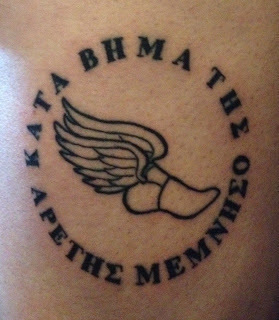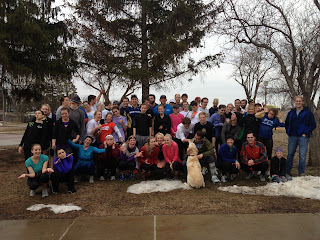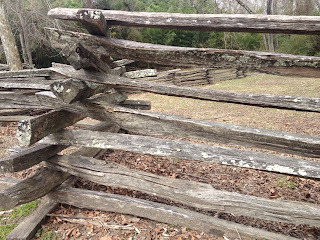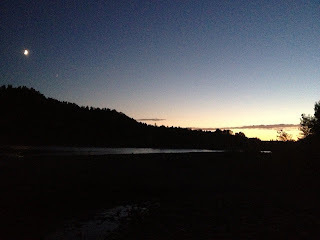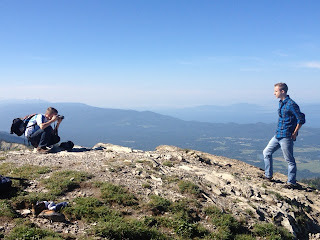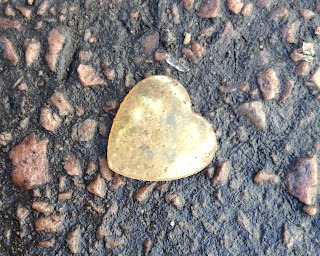∞
Spammer, Think Of Your Soul
I am barraged by spam and robocalls. Most of the email I get is spam, and similarly most of the calls I get are from machines that have been programmed to try to sell me something.
There are several things that bother me about this. One of the simplest is that I am receiving so many calls and emails that I don't want. The emails are a small bother; my spam filter catches some, and I delete the rest. It's tedious but tolerable. The robocalls are a bigger bother, because they've trained me to no longer answer the phone. Everything goes to voicemail unless I recognize the call as coming from a friend or family member.
But what bothers me most is the exclusion of rational conversation. I would love to be able to tell the spammers and robocallers that I, on principle, do not make impulse buys. I do not respond to any emailed ads, and I never buy something offered to me by a stranger over the phone. Nothing you send my way will interest me. In fact, just sending it my way, unsolicited, elicits the opposite response in me.
There is no way to say this, though. There is no conversation to be had. For a while I did answer the phone, and I asked the callers to remove my number from their lists. Until one caller told me, in no uncertain terms, that he would not do so. "But the law requires it," I protested. "No, you motherf***er," he said, "I will not, and there's nothing you can do about it." I protested again, and he again repeated his coarse epithet. There was no conversation to be had with him, unless I was willing to be his cash-provider. To him, I was not even a potential customer. I was a motherf***er, something not to be conversed with, but to be used for income.
One strong appeal of reason is that it is a substitute for violence. If we both want the same thing, we can reason together about whether it is possible to share resources, to take turns, to seek goods elsewhere. If we have a dispute, we do not need to resort to blows; we can seek a resolution in mutually acceptable terms. But we can only do this if our differences can be mediated by reason. When conversation is cut off absolutely, reason's reach is cut short.
Treating other people solely as means to income rather than as ends worthy of their own consideration independent of my interests cuts off conversation by deciding in advance that these mere means can have nothing to say that is worth listening to.
This angers me. In the ten minutes it has taken me to write this, I have received eight emails, seven of them spam. So I must say it here, even if I cannot say it to those who so mistreat me: I will continue to long for your rationality, for your willingness to remain within the bonds of society. But you must know that the habits of your capitalism are not only illegal but unethical and unkind. Which means that you are cutting yourself off from the people around you, one habit at a time. You may be gaining wealth, but what will you do with it? What will it profit you to gain the whole world and to lose the people around you, to lose your very soul? You may think you are gaining, but with each email sent, with each call made, you are spending a sliver of what makes you part of the community of humankind.
There are several things that bother me about this. One of the simplest is that I am receiving so many calls and emails that I don't want. The emails are a small bother; my spam filter catches some, and I delete the rest. It's tedious but tolerable. The robocalls are a bigger bother, because they've trained me to no longer answer the phone. Everything goes to voicemail unless I recognize the call as coming from a friend or family member.
But what bothers me most is the exclusion of rational conversation. I would love to be able to tell the spammers and robocallers that I, on principle, do not make impulse buys. I do not respond to any emailed ads, and I never buy something offered to me by a stranger over the phone. Nothing you send my way will interest me. In fact, just sending it my way, unsolicited, elicits the opposite response in me.
There is no way to say this, though. There is no conversation to be had. For a while I did answer the phone, and I asked the callers to remove my number from their lists. Until one caller told me, in no uncertain terms, that he would not do so. "But the law requires it," I protested. "No, you motherf***er," he said, "I will not, and there's nothing you can do about it." I protested again, and he again repeated his coarse epithet. There was no conversation to be had with him, unless I was willing to be his cash-provider. To him, I was not even a potential customer. I was a motherf***er, something not to be conversed with, but to be used for income.
One strong appeal of reason is that it is a substitute for violence. If we both want the same thing, we can reason together about whether it is possible to share resources, to take turns, to seek goods elsewhere. If we have a dispute, we do not need to resort to blows; we can seek a resolution in mutually acceptable terms. But we can only do this if our differences can be mediated by reason. When conversation is cut off absolutely, reason's reach is cut short.
Treating other people solely as means to income rather than as ends worthy of their own consideration independent of my interests cuts off conversation by deciding in advance that these mere means can have nothing to say that is worth listening to.
This angers me. In the ten minutes it has taken me to write this, I have received eight emails, seven of them spam. So I must say it here, even if I cannot say it to those who so mistreat me: I will continue to long for your rationality, for your willingness to remain within the bonds of society. But you must know that the habits of your capitalism are not only illegal but unethical and unkind. Which means that you are cutting yourself off from the people around you, one habit at a time. You may be gaining wealth, but what will you do with it? What will it profit you to gain the whole world and to lose the people around you, to lose your very soul? You may think you are gaining, but with each email sent, with each call made, you are spending a sliver of what makes you part of the community of humankind.
∞
Unwritten
Some of my favorite passages in any texts are about texts
that cannot be read.
Take the story of a man writing on the ground with his finger thousands of years ago. We do not know what he wrote, we only know that he wrote.
The story is in John’s Gospel, and the scene was this: some men brought Jesus a woman whom, they said, they had caught in adultery.
The passage does not occur in the oldest manuscripts, but it appears in some that are old enough that this pericope has been included in the canonical text.
And it is a delicious passage.
For one thing, it reminds us that even if we have the whole of the Scriptures, we still do not know everything Jesus said or wrote. Or thought.
It is one of the blank spaces in which commentary has not yet been written. Which makes it an invitation to imagine – not to devise religious rules on the basis of conjecture, but to engage in the work of strenuous wonder: what might he have written?
I came up with an answer once, and Merold Westphal put it even better in his book Suspicion and Faith. I won’t spoil it for you by telling you now.
In his writing on Aristotle, Charles Peirce sometimes invokes “that scamp, Apellicon,” the ancient editor of Aristotle's texts. Peirce charges him with altering Aristotle’s texts so that we now must guess at what Aristotle really wrote. (And by "guess" I mean a long and difficult reasoning process involving imagination and testing of hypotheses, not just wild conjectures.)
As I have read Peirce’s manuscripts, occasionally I’ve wanted to curse some unknown scamp who mishandled Peirce’s papers (perhaps Peirce himself) as when he will say “see my note on page 18 of this manuscript” and then I discover that the manuscript is incomplete, ending on page 17.
So I have to guess. What might Peirce have written?
Take the story of a man writing on the ground with his finger thousands of years ago. We do not know what he wrote, we only know that he wrote.
The story is in John’s Gospel, and the scene was this: some men brought Jesus a woman whom, they said, they had caught in adultery.
The passage does not occur in the oldest manuscripts, but it appears in some that are old enough that this pericope has been included in the canonical text.
And it is a delicious passage.
For one thing, it reminds us that even if we have the whole of the Scriptures, we still do not know everything Jesus said or wrote. Or thought.
It is one of the blank spaces in which commentary has not yet been written. Which makes it an invitation to imagine – not to devise religious rules on the basis of conjecture, but to engage in the work of strenuous wonder: what might he have written?
I came up with an answer once, and Merold Westphal put it even better in his book Suspicion and Faith. I won’t spoil it for you by telling you now.
In his writing on Aristotle, Charles Peirce sometimes invokes “that scamp, Apellicon,” the ancient editor of Aristotle's texts. Peirce charges him with altering Aristotle’s texts so that we now must guess at what Aristotle really wrote. (And by "guess" I mean a long and difficult reasoning process involving imagination and testing of hypotheses, not just wild conjectures.)
As I have read Peirce’s manuscripts, occasionally I’ve wanted to curse some unknown scamp who mishandled Peirce’s papers (perhaps Peirce himself) as when he will say “see my note on page 18 of this manuscript” and then I discover that the manuscript is incomplete, ending on page 17.
So I have to guess. What might Peirce have written?
Aldo Leopold wrote about this in his essay “The River of the Mother of God,” which was named for a river on an old map of South America. Some explorer had come upon the river in
the wilderness but did not know where it began or ended, so he drew a short
section of river without beginning or end, leaving it to future cartographers
to fill in the unknown sections.
It’s good to have some mysteries, some lacunae in our
knowledge.
Or rather, it’s good to be aware of some of the gaps in what we know.
As Socrates knew, this awareness of our own limitations is
one of the beginnings of the love of wisdom.
From there, curiosity draws us further on.
∞
Bicycles Belong On The Road
Road Rage
As I've shared yesterday's story about the Sioux Falls driver who assaulted a bicyclist, other bicyclists I know have shared similar stories. It seems all the serious riders I know have had run-ins with motorists who refuse to acknowledge their right to the road.
Many of us are fast enough that we come pretty close to riding at the speed limit, so we're not really slowing things down. Most of our major streets in Sioux Falls are wide enough to permit sharing the lane - giving motorists enough room to obey the three-foot buffer mandated by city law.
Should we bike on the sidewalk? No!
But even slow cyclists have a right to the roads. Drivers sometimes tell me to bike on the sidewalk. If they weren't driving away so fast, I'd take the time to let them know what a stupid idea that is.
If you're one of those drivers who wonders why I'm not on the sidewalk, here's why:
So not only do we have the legal right to be on the road and to occupy the lane, as you can see, biking is our best option.
And no, driving is not our best option. I will admit that if you're driving a car that weighs several tons, you're safer than I am when I'm straddling a twenty-pound aluminum frame. But what I'm doing is better for all of us, even for you. Think about it:
You and I have the right to drive on public roads maintained at public expense because we all agree it is worth paying for, and the laws make it possible and safe. Those same laws, and that same public opinion, supports the right of bicyclists to use those same roads.
As I've shared yesterday's story about the Sioux Falls driver who assaulted a bicyclist, other bicyclists I know have shared similar stories. It seems all the serious riders I know have had run-ins with motorists who refuse to acknowledge their right to the road.
Many of us are fast enough that we come pretty close to riding at the speed limit, so we're not really slowing things down. Most of our major streets in Sioux Falls are wide enough to permit sharing the lane - giving motorists enough room to obey the three-foot buffer mandated by city law.
Should we bike on the sidewalk? No!
But even slow cyclists have a right to the roads. Drivers sometimes tell me to bike on the sidewalk. If they weren't driving away so fast, I'd take the time to let them know what a stupid idea that is.
If you're one of those drivers who wonders why I'm not on the sidewalk, here's why:
- It's more dangerous. People pulling out of driveways don't look at who is coming down the sidewalk. Try this sometime and you'll see what I mean. You probably don't look either.
- It's more dangerous. Sidewalks are for walking. I think that's why they're called sidewalks. (See that word "walk" in there?) Which means that they're not engineered for biking. Telephone poles and guy wires and signposts for motorists jut out of and across sidewalks all over town, making it easy for anyone going at a decent pace to get knocked off their bikes.
- It's much slower. Bicyclists on the sidewalk must stop at every intersection, even if there isn't a stop sign. At every intersection. Ride a bike to work tomorrow and stop completely every few hundred yards if you don't get my point. You will get it very quickly.
- In some cases it's illegal. For instance, in downtown Sioux Falls. This is because
- It's more dangerous. Small children are on the sidewalk. People walking dogs are on the sidewalk. Wheelchairs and strollers are on the sidewalk. People leave things on the sidewalks.
- Also, it's more dangerous. Many sidewalks simply aren't maintained for biking. Branches are not trimmed well, and if the concrete joints aren't level, they can ruin a wheel.
So not only do we have the legal right to be on the road and to occupy the lane, as you can see, biking is our best option.
And no, driving is not our best option. I will admit that if you're driving a car that weighs several tons, you're safer than I am when I'm straddling a twenty-pound aluminum frame. But what I'm doing is better for all of us, even for you. Think about it:
- Bicycles cause almost no road wear, so we save the city from having to pay for the damage that heavy cars quickly cause;
- Bicycles use no fossil fuels, at least not directly, so we don't increase dependence on foreign oil. We're patriots like that. If you like enriching OPEC, I guess that's your right, but I don't quite get it;
- Bicycling is better for my health, which means that I am probably decreasing everyone's health care costs and staying healthy and productive.
- Bicycling is also better for your health, because bikes don't pollute. So that clean air you;re breathing? You're welcome;
- Bicycles take up less space on the road and in parking lots, which means the road is less congested, and you get a better parking spot. Again, you're welcome.
You and I have the right to drive on public roads maintained at public expense because we all agree it is worth paying for, and the laws make it possible and safe. Those same laws, and that same public opinion, supports the right of bicyclists to use those same roads.
*****
I'm not a member yet, but I've just discovered this organization, Falls Area Bicyclists. They look like they're up to some good work in our town. More bikes=better city.
∞
Bicycles, Handguns, and Cameras
Get Off My Hood!
I just read a post on Facebook about a bicyclist in my town who was struck by someone driving a pickup truck. The driver then yelled at the bicyclist to "get the f*** off my hood" and told him to ride on the sidewalk. The driver is obviously misinformed about our laws, as well as about civility.
The bicyclist managed to take a picture of the driver's face and his truck, but not his license plate, which is too bad.
Packing Heat On Two Wheels
The comments under the photo were especially interesting. I'm not sure if he was joking, but the bicyclist (whom I do not know) said that he often bikes with a .45 in his waistband, which dissuades drivers from treating him with hostility. This time he only had his camera, and he wasn't able to shoot pictures fast enough to capture all the evidence the police would need.
I understand his frustration. Last summer, while biking on an empty street five lanes wide, a motorist sped up behind me, swerved into my lane (I was biking along the shoulder) and yelled at me to "Get on the sidewalk!" then sped off. By the time I had my phone out, he was too far away to get a picture of his license plate. He sped off uphill, making it impossible for me to chase him down.
His recklessness and utter selfishness could have maimed or even killed me had I not safely dodged his oncoming car. His cowardice and lack of regard for my life made me livid.
You Better Outrun My Bullet
But I do not see how a gun would have helped me. Yes, perhaps he would have seen a gun in my waistband, but at his speed he very well might not have seen it. And what would I do with it? I'm not going to start squeezing off rounds at a fleeing motorist; to do so would make me a worse criminal than he. Besides, I was in no state to be handling a weapon: my heart was pounding, adrenaline was shooting through my veins. I was angry, and I was feeling that fright that comes when sudden and severe peril suddenly interrupts a calm day.
I don't want my world to be under constant surveillance, but I'm considering getting a GoPro or some other video camera that would run constantly when I bike on the street. I think if more of us did that, it would be a more effective deterrent than a firearm.
We're In This Together
More importantly, carrying a camera rather than a gun says something about community. The gun is about taking personal charge of one's security, and while I applaud the individual responsibility that implies, the camera insists that reckless driving is not my problem but our problem, a problem that we will deal with as a community, through the structures of law that constitute our community. If you harass bicyclists, I will film it, and I will hand the evidence over to the police.
This is what it means to live in a society that respects the rule of law. We don't live in the time of Euthyphro, who needed to enforce the law himself. We live in the age of the District Attorney; and whatever you may say about an individual D.A., the point of a state-appointed prosecutor is just this: she is the embodiment of our belief that to offend against one of us is to offend against all of us. We are in this together.
I don't want to foster hostility between motorists and cyclists; I want to foster mutual respect. The roads are wide enough to share. If we can learn to do so, we'll all wind up reaching good destinations, together.
*****
Update: Here's a link to an article by Jill Callison about the confrontation between the cyclist and the motorist in the Sioux Falls Argus Leader.
*****
Further Update: Here's a link to a bit of good news: the driver has been charged with several misdemeanors. This is good news for bicyclists, and bad news for hotheaded drivers unwilling to share the road with their neighbors.
I just read a post on Facebook about a bicyclist in my town who was struck by someone driving a pickup truck. The driver then yelled at the bicyclist to "get the f*** off my hood" and told him to ride on the sidewalk. The driver is obviously misinformed about our laws, as well as about civility.
The bicyclist managed to take a picture of the driver's face and his truck, but not his license plate, which is too bad.
 |
| My speedy steed. Please do not hit me. |
Packing Heat On Two Wheels
The comments under the photo were especially interesting. I'm not sure if he was joking, but the bicyclist (whom I do not know) said that he often bikes with a .45 in his waistband, which dissuades drivers from treating him with hostility. This time he only had his camera, and he wasn't able to shoot pictures fast enough to capture all the evidence the police would need.
I understand his frustration. Last summer, while biking on an empty street five lanes wide, a motorist sped up behind me, swerved into my lane (I was biking along the shoulder) and yelled at me to "Get on the sidewalk!" then sped off. By the time I had my phone out, he was too far away to get a picture of his license plate. He sped off uphill, making it impossible for me to chase him down.
His recklessness and utter selfishness could have maimed or even killed me had I not safely dodged his oncoming car. His cowardice and lack of regard for my life made me livid.
You Better Outrun My Bullet
But I do not see how a gun would have helped me. Yes, perhaps he would have seen a gun in my waistband, but at his speed he very well might not have seen it. And what would I do with it? I'm not going to start squeezing off rounds at a fleeing motorist; to do so would make me a worse criminal than he. Besides, I was in no state to be handling a weapon: my heart was pounding, adrenaline was shooting through my veins. I was angry, and I was feeling that fright that comes when sudden and severe peril suddenly interrupts a calm day.
I don't want my world to be under constant surveillance, but I'm considering getting a GoPro or some other video camera that would run constantly when I bike on the street. I think if more of us did that, it would be a more effective deterrent than a firearm.
We're In This Together
More importantly, carrying a camera rather than a gun says something about community. The gun is about taking personal charge of one's security, and while I applaud the individual responsibility that implies, the camera insists that reckless driving is not my problem but our problem, a problem that we will deal with as a community, through the structures of law that constitute our community. If you harass bicyclists, I will film it, and I will hand the evidence over to the police.
 |
| We're in this together. Can we share the road? |
I don't want to foster hostility between motorists and cyclists; I want to foster mutual respect. The roads are wide enough to share. If we can learn to do so, we'll all wind up reaching good destinations, together.
*****
Update: Here's a link to an article by Jill Callison about the confrontation between the cyclist and the motorist in the Sioux Falls Argus Leader.
*****
Further Update: Here's a link to a bit of good news: the driver has been charged with several misdemeanors. This is good news for bicyclists, and bad news for hotheaded drivers unwilling to share the road with their neighbors.
